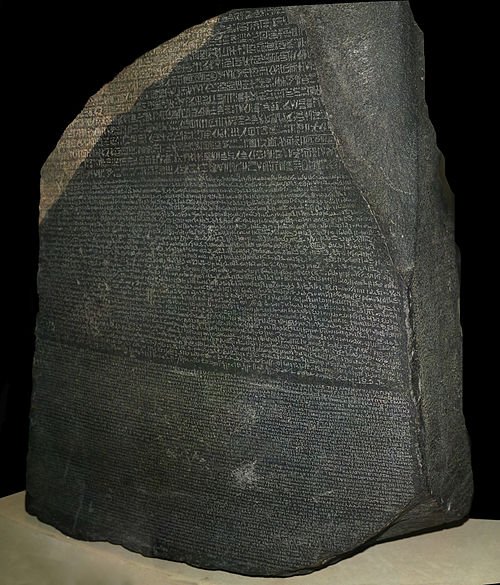How did knowledge of the Ancient Egyptian language disappear?
Languages usually hang around in some form or other for a long time. For example French, Italian and Spanish are clearly descendants from Vulgar Latin (street Latin), and they use the same Latin script. Modern Greek is derived from ancient Greek and also uses the same script the ancient greeks used. And Hindi is derived from Sanscrit and uses the same script as the ancient Indians used.
So how did knowledge of Ancient Egyptian die out so thoroughly that people in the 19th century (including Egyptians) couldn't read hieroglyphics?
The answer lies in the multiple conquests the Egyptians experienced from around 300 BC onwards.
The ancient Egyptians had two main scripts - the first was the elaborate hieroglyphics which were inscribed onto stones, tombs and temples. For writing on papyrii they used a cursive hieroglyphic which evolved into hieratic, which was a cursive script that was quick and easy to write compared to full hieroglypcs, and thus ideal for business, letters, accountancy and so on.
The first conquest was by the Persians, and when Persia was conquered by Alexander the Great, their posessions including Egypt fell into Greek hands. His general Ptolomy became Pharoah on Alexander's death and a hybrid Egyptian/Greek culture started to form.
Under the Persians, demotic replaced hieratic as the main script for government business. But the Greeks who followed the Persians were confused by demotic as the script was unfamiliar, and invented Coptic. Coptic is simply ancient egyptian written in greek letters, though it included some demotic letters for sounds that didn't exist in greek. This is similar to how westerners write Chinese words using a latin script to make it easier to read - the language is the same but the script is different.
Greek Egypt was quickly taken over by the Romans, but Egypt continued to speak two languages, ancient Egyptian and Greek, they never switched to Latin.
When Christianity spread through the Roman empire, the bible was written in Coptic. And when the Emperor Theodosius I issued the Edict of Thesselonica in 380, banning all religions but Christianity, Coptic Egyptian became the dominant script in Egypt, everything else was killed off as it was linked to the old gods.
Things remained stable for a few centuries, with the egyptian language surviving, but the ability to read hieroglyphs, hieratic and demotic faded away as they weren't needed any longer. By this time it had been a thousand years since the last pharoah's tomb had been built.
Then came the biggest transformation of all, the invasion of the Arabs in the 7th century AD. They brought with them a new language, Arabic, a new script, and a new religion.
The Caliphate that dominated Egypt didn't exactly force people to convert to Islam, but they used a subtle form of coercion. They taxed anyone who wasn't muslim. As centuries rolled on, more and more people converted to Islam (and in the process adopted Arabic as their main language and script). Some would have converted immediately to save money. Others would have held out till some misfortune happened (illness/loss of business) and they couldn't afford the tax anymore.
The Coptic Christians who survived for the thousand years since the Arab invasion were those who could afford to pay the apostate tax continuously through that period. But as their numbers dwindled, they started to speak and write Arabic, simply because that's what everyone else was speaking and they had to do business with them. Essentially they became Arabic-speaking Christians, with Coptic only spoken by the priests of the Egyptian Orthodox church.
The net result is that Egypt came to speak Egyptian-Arabic and the ancient egyptian language had all but died out apart from a few priestly Coptic Christian scholars.
How hieroglyphs were deciphered
There was a final invasion, by Napoleon, and his troops discovered the Rosetta stone, so called because it was found in a place in Egypt called Rosetta. It had three scripts engraved on it, hieroglyphic, demotic and greek.
It was made in 196 BC by Ptolomy V (so during the Greek period and before the Roman period). As a result the Greek at the bottom of the stone is pure Ancient Greek, not Coptic, and scholars in the 19th century could read it. They then started to compare the greek text with the hieroglyphic text to work out which sounds the hieroglyphs represented.
As it turns out, the Coptic preserved by the priests was also a major key, as it was ancient egyptian written in a greek script. So you had pure greek, egyptian written in demotic, egyptian written in hieroglyphs and the addition of scolarly papers of coptic egyptian written in coptic. Hieroglyphcs tend to record mainly consonant sounds but Coptic records vowel sounds too - so we now have an idea of what ancient egyptian sounded like.
Does anyone speak the ancient egyptian language today?
Modern Egypt speaks Egyptian-Arabic, and Coptic has completely fallen out of use apart from by some tenacious coptic priestly scholars.
But the language of Wolof in Senegal is derived from Ancient Egyptian, as is Kalenjiin which is spoken by people in Ethiopia (ancient Nubia). The Nubians traded a lot with the ancient egypians, and now that we've cracked the mystery of ancient egyptian, it is clear it is alive and well.

Congratulations @alyssas! You have completed the following achievement on Steemit and have been rewarded with new badge(s) :
Click on the badge to view your Board of Honor.
If you no longer want to receive notifications, reply to this comment with the word
STOPI understand that the Copts in Egypt are trying to revive their language outside of the churchs (in other words trying to speak it in daily life). I wish them luck.